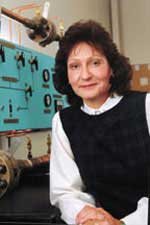Oil research could bring revenue to Missouri
Posted by news
One key to lessening the nation’s reliance on foreign oil could be right here in Missouri, according to University of Missouri-Rolla researchers.
 |
| Dr. Shari Dunn-Norman, associate professor of petroleum engineering at UMR, is looking for ways to get oil from Missouri’s shallow oil fields. |
The researchers hope to make oil production in Missouri more affordable and bring revenue to the state by developing new methods of recovery.
UMR researchers are studying the heavy oil deposits in Vernon County, Mo., in the western part of the state near Joplin, Mo. Throughout this area oil can be found just 160 feet below the Earth’s surface. This is considered extremely shallow, especially when one considers that oil is usually found thousands of feet beneath the surface, says Dr. Shari Dunn-Norman, associate professor of petroleum engineering, who is leading UMR’s research effort.
The U.S. Department of Energy is providing $641,000 in funding for this two-year project. Garland Oil and Gas Inc., Nolte Smith Inc. (NSI), Halliburton Energy Services, J-Environmental, Direct Geochemical Inc. and UMR are contributing another $675,000, bringing the total funding for this project to more than $1.3 million.
While Missouri is not known as a major oil-producing state, experts have estimated that it has the equivalent of more than two billion barrels lying beneath its surface. "The implication to the economy in the state of Missouri is enormous," says Dunn-Norman. "UMR, having the only petroleum engineering department in the state, is leading the way in technology in demonstrating how to develop this natural resource.
"Major oil companies have attempted to develop this resource in the past and have been technically successful but economically unsuccessful because the overhead costs amounted to more than what could be produced," says Dunn-Norman. Recovering the oil in Missouri has proved difficult because the oil is heavy, meaning it has high density. Also, because the oil deposits are very shallow, there is less reservoir pressure to lift the oil to the surface, she says.
Dunn-Norman and her colleagues are using a variety of methods to recover this oil in an economic fashion. The methods include hydraulic fracturing, microbial-enhanced oil recovery (MEOR), electrical resistivity tomography (ERT) and surface geochemistry.
Hydraulic fracturing occurs when pressure is placed on the rock containing the oil, which causes the rock to crack. The crack then acts as a "superhighway," giving the oil a flow-path through the reservoir, says Dunn-Norman. These cracks will also aid the MEOR by allowing microbes (bacteria) a direct route to access the oil.
MEOR introduces microbes or bacteria that digest the oil found in the reservoir and alter the oil’s composition and characteristics so that it can be produced more readily. Using hydraulic fracturing combined with MEOR should allow better placement of microbes and aid in oil recovery.
Another aspect of the researchers’ method is the use of ERT to map the shallow oil deposits and to track how the microbes are moving in the reservoir. Surface geochemistry will be applied to soil samples as an overall exploration method and to determine the "sweet spots" in the reservoir, says Dunn-Norman.
"We are trying to demonstrate a relatively low-cost, economic method that is effective and sustainable," says Dunn-Norman. "We would like to present a technology that could be given to local landowners so they can locate oil on their property, drill and produce a well and still make money if oil prices drop below $20 per barrel."
UMR researchers involved in this project include Dunn-Norman; Dr. Daopu Numbere, professor of petroleum engineering; Dr. Anuj Gupta, associate professor of petroleum engineering; and Dr. Estella Atekwana, associate professor of geophysics.
Another researcher involved is Dr. Lee Slater, assistant professor of geology at Rutgers University.
Petroleum engineering is a growing field and UMR offers both undergraduate and graduate degrees. Undergraduates have opportunities for employment in the oil and gas industry, the oil service/consulting industry, government, and with environmental engineering firms.
"Petroleum engineers are among the highest paid engineers in the country," says Dunn-Norman. "In addition, with the aging population, most petroleum engineers in industry are reaching retirement age. This leaves tremendous opportunities for our undergraduates and young professionals. Many of our recent graduates have had the opportunity to work offshore or abroad."